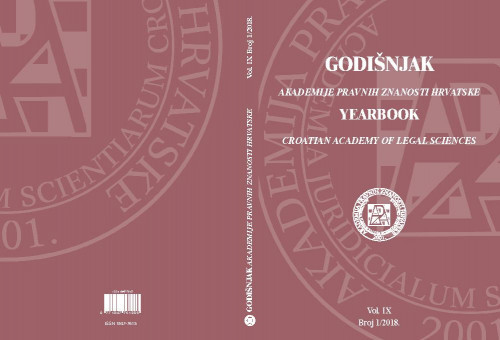Rad se bavi analizom reakcija Ujedinjenih naroda na zločin terorizma u obliku inkriminacije terorizma u nizu konvencija prihvaćenih u krilu te organizacije, no još više u obliku moralnih, ali i pravnih sankcija sadržanih u političkim osudama neobvezujućih rezolucija Opće skupštine, posebice tijekom hladnog rata, kao i u obvezujućim sankcijskim rezolucijama Vijeća sigurnosti počevši od 90-ih godina prošlog stoljeća. Pritom rad upućuje na specifičan razvojni proces koji počinje sankcijama prema državama odgovornima za tzv. „državni terorizam“, a u posljednjih 15-ak godina sankcije su se gotovo potpuno usmjerile prema terorističkim organizacijama kao nedržavnim akterima te su razvojem međunarodnoga kaznenog pravosuđa otvorile prostor i individualnoj međunarodnoj kaznenoj odgovornosti za taj zločin.; This paper analyzes the United Nations' reactions to the international crime of terrorism. It focuses on counter-terrorism international conventions adopted within the UN, as well as on moral and political sanctions contained in non-binding resolutions of the General Assembly during the period of the so-called ˝Cold war˝. However, the main focus of this research is on the analysis of legally binding resolutions adopted by the Security Council starting from the 1990s. The analysis of the development of the Security Council's resolutions adopted under Chapter VII of the UN Charter indicates that these resolutions, initially addressed to states responsible for the so- called ˝state terrorism˝, gradually became directed exclusively towards terrorist organizations as non-state actors. In this context, the ˝ISIL (Da'esh) and Al-Qaida Sanctions List˝ of the Security Council is being continuously expanded with names of individuals as well as of other non-state ˝entities and other groups˝ affected by these sanctions. Unfortunately, compared to the beginnig of 2015, when only 70 ˝entities and other groups˝ were listed, in March 2017 their number increased to over 360. These ˝entities and other groups˝, which originate from Tunisia, Mali, Albania, Afghanistan, Ethiopia, Bangladesh, the Comoros, Pakistan, Indonesia, Somalia, Kenya, Tanzania, Arabian Peninsula, Libya, Sudan, Egypt, the Caucasus region, Uzbekistan, and even Bosnia and Herzegovina, differ in various ways. Some of the above mentioned ˝entities˝ aim at overthrowing the government of their country, just like ˝classical˝ insurgents as temporary subjects of international law. Other non-state actors' activities are directed towards establishing a new state (for example, Ansar Eddine, Mouvement national de libération de l'Azawad – MNLA in Mali, Sudan People's Liberation Movement – SPLM in South Sudan). International crimes committed by these organizations are not only
Sažetak

 Godišnjak Akademije pravnih znanosti Hrvatske : Yearbook croatian academy of legal sciences : 9,1(2018) / glavna urednica, editor-in-chief Irena Majstorović.
Godišnjak Akademije pravnih znanosti Hrvatske : Yearbook croatian academy of legal sciences : 9,1(2018) / glavna urednica, editor-in-chief Irena Majstorović.